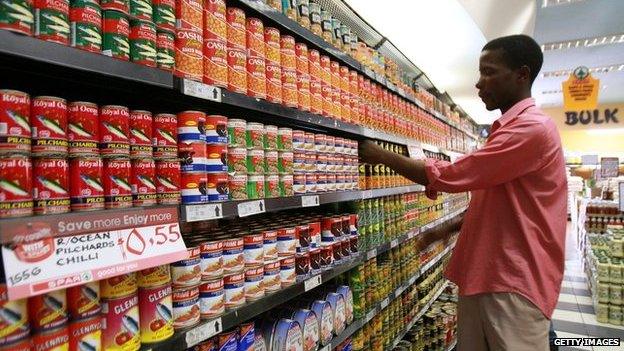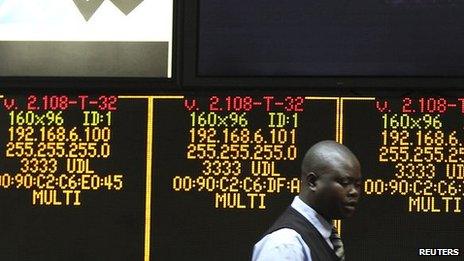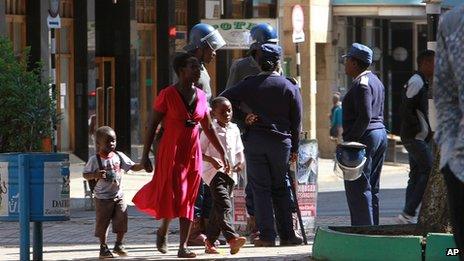Zimbabwe: 'Huge' economic challenges after election
- Published

Zimbabwe's election may have been a triumph for President Robert Mugabe, but the economic impact looks uncertain, with the country now facing "huge challenges", say analysts.
Harare's stock market has fallen heavily this week, with some companies' share prices falling up to 20% on Monday, following the news that Morgan Tsvangirai's opposition Movement for Democratic Change (MDC) had been decisively beaten for the third time by President Mugabe's Zanu-PF party.
Mr Tsvangirai has said he will seek to challenge what he has called a "sham" result, and has until the end of the week to make his case with the courts.
The United States and European Union also questioned the election, but observers from the 15-nation Southern African Development Community (Sadc) said the vote had reflected the "will of the people".
But whatever the politics, of immediate importance to ordinary Zimbabweans is whether the country's frail economy can survive the end of the MDC and Zanu-PF unity government and the return to Zanu-PF rule.
Before the coalition was formed in 2009, the country had gone from being one of Africa's strongest economies to one of its weakest - as Zimbabweans grappled with hyperinflation, mass unemployment and widespread poverty.
Hyperinflation was largely brought under control when Zimbabwe abandoned its own currency and adopted the US dollar in 2009.
The question for many investors now is what kind of policies the new government will pursue.
Targeting foreign firms
At the heart of this is Zanu-PF's indigenisation law - a policy to acquire 51% ownership of 1,100 foreign-controlled companies operating in the country.
The world's two largest platinum producers, Anglo American Platinum and Impala Platinum Holdings, have already had to sell majority shares in their local operations.
The mining sector is key to Zimbabwe's earnings, accounting for 71% of its exports, $720m (£465m) in the first four months of 2013.

Zanu-PF's indigenisation policy is making investors wary
Despite Zanu-PF's victory, the mining firms are likely to stay put, says Justin Froneman, platinum analyst at SBG Securities in Johannesburg.
"There is no rush to do anything right now," he says.
"The elections do not change the status quo for these companies."
Before the vote, some observers had voiced the hope that Zanu-PF's indigenisation agenda was largely electioneering.
However, the government has since restated its commitment to the policy.
"Over the next five years Zimbabwe is going to witness a unique wealth-transfer model that will see ordinary people taking control of the economy," Zanu-PF said in a statement this week.
It aims to set up a $7bn (£4.5bn) state empowerment fund for Zimbabweans, though there are few details as to how this will work.
Foreign-owned banks, including Standard Chartered and Barclays, are next in the government's sights.
The minister responsible for the indigenisation programme, Saviour Kasukuwere, said the government would compensate bank owners and that companies in other sectors might only be required to hand over smaller stakes in their operations.
'Cause for concern'
But for many analysts, there are big question marks over how this policy will play out, and growth estimates for 2013 have been cut from 5% to 3.4%.
"What we are seeing now is a level of uncertainty," says Catherine Grant-Makokera, of the South African Institute of International Affairs in Johannesburg.
"Investors are very reluctant to put more capital into Zimbabwe at the moment - and that is leading to a slowdown in growth."

Unemployment is officially under 11% but is believed to be much higher
Godfrey Kanyenze, of the Labour and Economic Development Research Institute of Zimbabwe think-tank, is sceptical that many ordinary Zimbabweans will reap the benefits of these changes in share ownership.
"People are aware that Zanu-PF was campaigning on the back of continuation with economic empowerment and indigenisation - which most people read as policies which just benefit the elite," he told BBC World Service's World Business Report.
"If you just target the few companies that are remaining in the economy and you are taking over their share ownership, and 51% is given to the local population who do not have the capacity then to finance that 51% - that is a recipe for disaster."
However, Mr Kasukuwere this week defended the indigenisation programme, saying it was a "logical economic plan" that would help Zimbabweans "achieve greater benefits from their resources".
Limited options
Whatever the merits of compelling companies to cede share ownership, Zimbabwe still faces "huge economic challenges, particularly around unemployment", says Ms Grant-Makokera.
In January 2012, Zimbabwe's Reserve Bank said unemployment was 10.7%. But many others organisations, such as the UN, put the figure as high as 80-94% - the size of the country's informal sector makes an accurate figure hard to gauge.
Zimbabwe is a country of "enormous disparities between a very wealthy few and the impoverished mass, with a squeezed middle," says Sue Onslow, of the Africa international affairs programme at the London School of Economics.
"The economy's doing much better than it was in 2008-2009, but it's started to falter.
"The lack of a stable policy environment has been a cause for concern for the international business community that wants to put substantial investment into the country."
But the government's room for manoeuvre seems to be limited.
Mr Kanyenze says: "Even before the election, 70% of the budget was going on employment costs, so very little was remaining for service delivery or rehabilitating the infrastructure, which implies that all those issues which are critical for growing the economy - dealing with power outages, water shortages, the decay of infrastructure, the cost of capital and dealing with the out-datedness of technology... those issues are not going to be dealt with.
"We are in a survivalist mode at the moment, with very little in the state coffers at the moment."